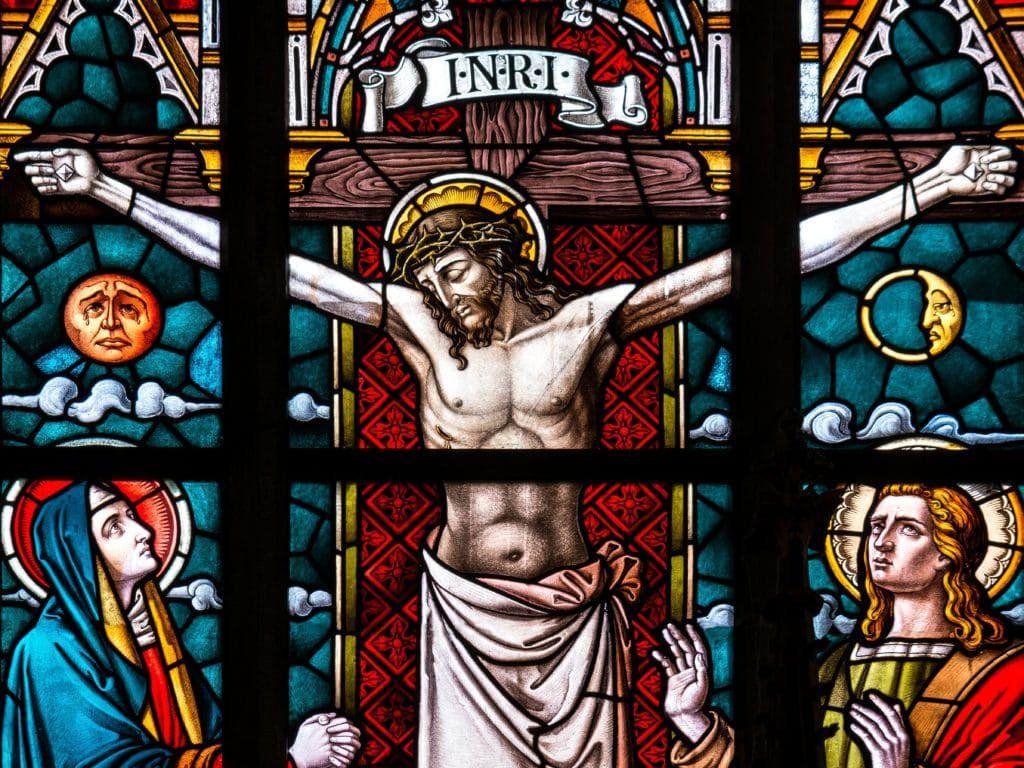Hearing the Good News of the Gospel is only one part of the message. Because the Gospel is an invitation, we cannot be only hearers of the word — it requires a response. What then is the proper response for us to have to this message of God’s radical love for us in the abasement of Jesus Christ?
Realizing the depth of God’s love for us means we can have only one response: We must entrust our lives completely into God’s hands. God has proven — beyond a shadow of a doubt — his trustworthiness in Jesus on the cross. St. Paul tells the Philippians that Jesus, in his love for us, “emptied himself” and gave up his life … for each of us.
In emptying himself and robbing death of its sting, Jesus becomes lord. He becomes the name at which every knee must bow. He has plundered the kingdom of death and now has possession of the entire storehouse of graces at his disposal. We can say with all confidence that Jesus has all we need. Each of us can assert: He has freed me from this kingdom of death. He has freed me from this slavery.
The only logical response in the face of this overwhelmingly beautiful news is complete surrender. We must proclaim Jesus as the lord of our lives. This means he has ultimate, supreme and total control over every part of our lives. Since he has ransomed us from death, we owe our whole lives to him. And since it was specifically “while we were still sinners” that Christ died for us, we can have no doubt in Jesus’ love for us. Therefore, we must make an act of total trust and total surrender to Jesus.
Surrender with confidence
This act of surrender is what we call faith. It requires placing each part of our lives into Jesus’ hands. Each of us should ask ourselves: What vocation am I called to? What should I do with my free time? What should I do with my money? How am I to understand my sexuality? What Netflix shows should I watch? What is the measure of my success? All of these questions must be placed before Jesus as lord, and we must receive from him the way forward.
Early Christians did this in such a powerful way that it caused comment — sometimes admiration, sometimes ridicule — from their neighbors, families and friends. In the Letter to the Hebrews, the author speaks about the sacrifices these Christian disciples were willing to make to be faithful to Jesus: “Remember the days past when, after you had been enlightened, you endured a great contest of suffering. At times you were publicly exposed to abuse and affliction; at other times you associated yourselves with those so treated. You even joined in the sufferings of those in prison and joyfully accepted the confiscation of your property, knowing that you had a better and lasting possession” (Heb 10:32-34). After they had come to faith (“been enlightened”), they were willing to suffer persecution, go to jail and have their property unjustly taken from them rather than refuse to call Jesus their lord.
The persecution of Christians around the world in our age is no less severe than in the time of the apostles. Many of our brothers and sisters in the Middle East, North Africa, Sri Lanka and other places around the world risk their careers, possessions and even their lives by professing Jesus as lord. Fortunately, the odds of our suffering to this degree for our faith are rather remote. Yet, it is no small task for us to be men and women of faith.
Surrendering our lives to the God who loved us so much that he died for us means we desire what God desires for us. It means we actively seek out God’s will for our lives — and then we embrace it as the best plan for our lives! It means we trust God’s plan for our lives more than our own plans. God is not our copilot; rather, he must be the pilot of our lives.
Entrusting our lives into God’s hands leaves us none the poorer. Even when we must make sacrifices of other goods in our lives — when we must “take up our crosses” to follow Jesus — we know by faith that God will not leave us wanting. We have confidence because “he who did not spare his own Son but handed him over for us all, how will he not also give us everything else along with him?” (Rm 8:32). There is nothing God will not give us if we trust him.
The gift of faith
Faith is rooted in the sacrament of baptism, by which we are incorporated into the body of Christ and given the grace to live the Christian life. Baptism makes this life of faith possible. It is in baptism that we participate in the paschal mystery of Jesus’ death and resurrection. Baptism is the perfect image — and the effective means of — faith.
Most Catholics are baptized in infancy. For us, that means the gift of faith has been given to us through the profession of our parents. Each of us is called to “stir into flame the gift of God” that we’ve received. We must actively invite Jesus (as lord!) into every part of our lives.
God’s plan for the world was one of harmony and perfection. The consequences of sin brought about upheaval to this harmony and ultimately led to our enslavement. The Father sent Jesus to show us the face of God. He hunted down sin and death and robbed “the strong man’s house” to set us free (cf. Mk 3:22-30). Jesus invests his entire life into our salvation; he dies so you and I can have freedom and eternal life. The only proper response to such an incredible, immeasurable and unrepayable gift is our total surrender to God. The only proper response is faith in God’s goodness and obedience to his commands.


